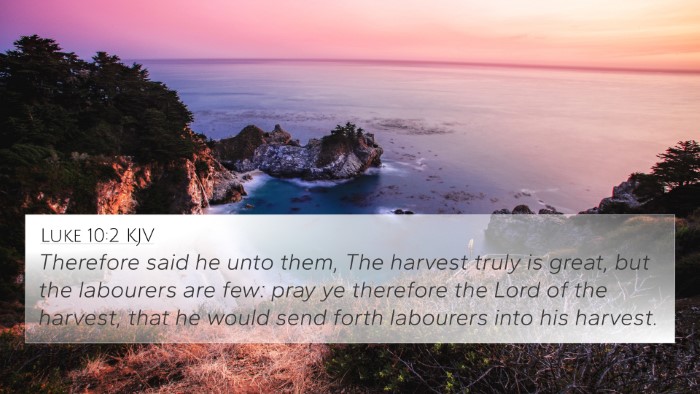Understanding 2 Timothy 2:6
In 2 Timothy 2:6, the Apostle Paul presents a powerful metaphor regarding the relationship between hard work and reward in the context of Christian ministry. This verse states:
"The hard-working farmer should be the first to receive a share of the crops." (NIV)
Summary of the Verse's Meaning
This verse emphasizes the importance of diligence and effort in service to God, drawing a parallel with a farmer who must toil for the harvest. The underlying message indicates that those who labor in ministry are entitled to the blessings that come from their labor.
Combined Insights from Public Domain Commentaries
-
Matthew Henry:
Henry highlights the necessity of labor in spiritual pursuits, akin to the physical toil of a farmer. He explains that the laborer is first to benefit, stressing God's justice in rewarding those who serve Him faithfully.
-
Albert Barnes:
Barnes draws attention to the depiction of a farmer as a model for Christian ministers. He underscores that like the farmer who waits patiently for the harvest, a minister must also remain steadfast in their duties, trusting in eventual spiritual rewards.
-
Adam Clarke:
Clarke reflects on the metaphorical significance of agriculture in biblical texts. He elucidates how the gardening of souls requires dedication, and those who labor earnestly in God’s work will be the first to reap the heavenly rewards.
Key Themes and Connections
This verse can be connected thematically to various scriptures that discuss labor, reward, and diligence. The connections between Bible verses highlight the collaborative narrative of Scripture regarding the importance of effort in spiritual matters.
Bible Cross-References
- Galatians 6:9: "Let us not become weary in doing good, for at the proper time we will reap a harvest if we do not give up."
- 1 Corinthians 9:10: "Surely he says this for us, doesn’t he? Yes, this was written for us, because whoever plows and thrashes should be able to do so in the hope of sharing in the harvest."
- Matthew 9:37-38: "Then he said to his disciples, 'The harvest is plentiful but the workers are few. Ask the Lord of the harvest, therefore, to send out workers into his harvest field.'
- 2 Thessalonians 3:10: "For even when we were with you, we gave you this rule: 'The one who is unwilling to work shall not eat.'
- Proverbs 10:4: "Lazy hands make for poverty, but diligent hands bring wealth."
- James 5:7: "Be patient, therefore, brothers, until the coming of the Lord. See how the farmer waits for the precious fruit of the earth, being patient about it, until it receives the early and the late rains."
- Colossians 3:23-24: "Whatever you do, work heartily, as for the Lord and not for men, knowing that from the Lord you will receive the inheritance as your reward."
Inter-Biblical Dialogue
The engagement between different texts in the Bible provides a rich framework for understanding the ethical and spiritual imperatives within the faith journey. Understanding 2 Timothy 2:6 within its cross-referenced context allows believers to grasp the significance of their labor in the ministry and its ultimate rewards from God.
Tools for Bible Cross-Referencing
- Bible Concordance: A useful tool that helps locate verses based on keywords.
- Bible Cross-Reference Guide: Guides readers in finding parallel verses across different books.
- Cross-Reference Bible Study: An approach that encourages deeper understanding by linking themes.
- Comprehensive Bible Cross-Reference Materials: Resources designed to assist studies and sermons effectively.
Conclusion
2 Timothy 2:6 serves as a reminder of the Christian calling to diligent labor in ministry. By understanding the connections between this verse and others through cross-referencing, believers are equipped to recognize the consistent biblical theme of perseverance and divine reward. Engaging with the Scripture through these insights enhances one's faith journey and provides a deeper appreciation for the interconnectedness of biblical teachings.












